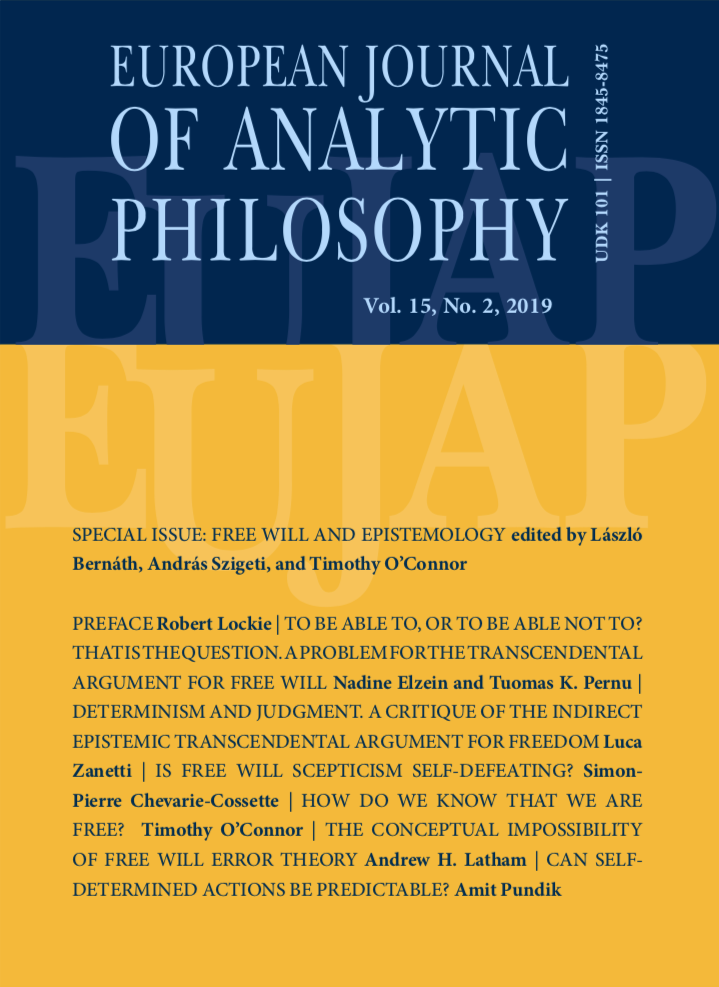- The Preoccupation and Crisis of Analytic Philosophy
Michael LosonskyPages: 5-20 | Abstract
The received view in Chomskian linguistics is that linguistic intuitions are the product of a linguistic competence residing in aI propose to reconsider Gilbert Ryle’s thesis in 1956 in his introduction to The Revolution of Philosophy that “the story of twentieth-century philosophy is very largely the story of this notion of sense or meaning” and, as he writes elsewhere, the “preoccupation with the theory of meaning is the occupational disease of twentieth-century Anglo-Saxon and Austrian philoso- phy.” Ryle maintains that this preoccupation demar- cates analytic philosophy from its predecessors and that it gave philosophy a set of academic credentials as a rigorous discipline with its own domain and method. I will maintain that Ryle, with some minor qualifica- tions, was correct in his assessment of the nature of analytic philosophy at that time, and I will argue that the next 50 years continued to be, very largely, the story of meaning, exemplified by the groundbreaking work of Rawls and Kripke. However, I argue that this work also contains the seeds that contributed to the emergence of philosophies that represent a significant departure from analytic philosophy. - What is Probability and Why does It Matter
Zvonimir ŠikićPages: 21-43 | Abstract
The idea that probability is a degree of rational belief seemed too vague for a foundation of a mathematical theory. It was certainly not obvious that degrees of rational belief had to be governed by the probability axioms as used by Laplace and other prestatistical probabilityst. The axioms seemed arbitrary in their interpretation. To eliminate the arbitrariness, the stat- isticians of the early 20th century drastically restricted the possible applications of the probability theory, by insisting that probabilities had to be interpreted as relative frequencies, which obviously satisfied the probability axioms, and so the arbitrariness was removed. But the frequentist approach turned more subjective than the prestatistical approach, because the identifications of outcome spaces, the choices of test statistics, the declarations of what rejection regions are, the choices of null-hypothesis among alternatives, the contradictory choices between sizes and powers etc., depend on thoughts or even whims of the experimenter. Frequentists thus failed to solve the problems that motivated their approach, they even exacerbated them. The subjective Bayesianism of Ramsey and de Finetti did not solve the problems either. Finally Cox provided the missing foundation for probability as a degree of rational belief, which makes the Bayesian probability theory (which is based on this foundation) the best theory of probable inference we have. Hence, it is quite unbelievable that it is not even mentioned in recent philosophy textbooks devoted to the probable inference. The reason could be that it requires fairly sophisticated mathematics. But not even to mention it? We explain the history and prove Cox theorem in a novel way. - The Probability of the Possible
Ron WilburnPages: 44-55 | Abstract
In “Why is There Anything at All?” Peter van Inwagen argues that even though it was never necessary that concrete beings existed, it was always maximally probable – just short of necessity – that they did (van Inwagen, 1996). I argue that van Inwagen’s argument fails, albeit for an interesting reason which has remained so far unnoticed in the literature: there is a critical ten- sion between two of its premises, both essential to its soundness, concerning the nature of comprehensively specified possible worlds. I summarize van Inwagen’s argument, develop this objection, and then describe more problems which invariably accrue when we try to ascribe probability values to possible worlds. - Why Semantic Unspecificity is not Indexicality
Delia BelleriPages: 56-69 | Abstract
In this paper, I address the idea that certain sentences (“It’s raining”, “The leaves are green”, “Sally reads an Italian book”) suffer from what is generally called semantic unspecificity: their meaning is determinate, but their truth conditions are not. While there tends to be agreement on the idea that semantic unspecificity differs from phenomena such as ambiguity and vagueness, some theorists have defended an account which traces it to indexicality, broadly construed. Some authors have tried to vindicate the distinction between unspecificity and indexicality and, in this paper, I pursue the same cause, but with a critical stance towards previously employed strategies. I urge that the central argument employed by Sainsbury to trace this difference fails suitably to set unspecificity apart from indexicality and I propose a new argument, which helps to trace this distinction more perspicuously. The argument is based on embeddings of indexical and unspecific expressions within modal operators and on the ways in which the truth conditions of utterances of the resulting, complex expressions are thereby affected. - On the Rational Importance of Urges
Simon RipponPages: 70-75 | Abstract
A reply to Reitsma’s paper “How a Modern-Day Hume Can Reject a Desire Categori- cally: A Perplexity and a Theoretically Modest Proposal”.

